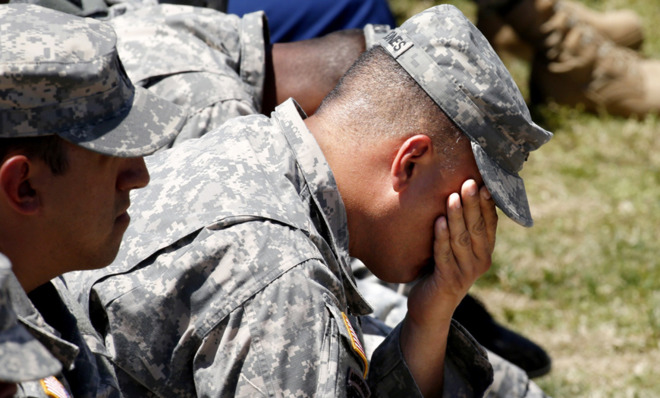Will guns and therapy stop military base killings?
After the second shooting at Fort Hood in five years, lawmakers are looking for answers

A free daily email with the biggest news stories of the day – and the best features from TheWeek.com
You are now subscribed
Your newsletter sign-up was successful

Providing better mental health services and arming base personnel will help prevent shootings like the one at Fort Hood last week, according to some lawmakers and former military officials.
Rep. Michael McCaul (R-Texas), chairman of the House Homeland Security Committee, said that in the wake of last week's shooting at Fort Hood in Texas, lawmakers should consider ways to allow more military personnel to carry firearms on bases.
"They defend us overseas and defend our freedom abroad, so the idea that they are defenseless when they come on our home bases, I think, Congress should be looking at that and having a discussion with the bases about what would be the best policy," McCaul said on Fox News Sunday.
The Week
Escape your echo chamber. Get the facts behind the news, plus analysis from multiple perspectives.

Sign up for The Week's Free Newsletters
From our morning news briefing to a weekly Good News Newsletter, get the best of The Week delivered directly to your inbox.
From our morning news briefing to a weekly Good News Newsletter, get the best of The Week delivered directly to your inbox.
"We should be looking at the idea of senior leadership at these bases, give them the ability to carry a weapon," he added.
An official at the U.S. Army's Fort Hood base says there is a "strong possibility" that the gunman who killed three people and wounded 16 others argued with one or more of the victims.
Army officials said Spec. Ivan A. Lopez's shooting spree was sparked by an argument over leave-of-absence paperwork. Lopez shot and killed four people, including himself, and wounded 16 others in the process.
Last week's incident was the third fatal shooting on a U.S. military base since mid-September and the second at Fort Hood since 2009, when an Army psychiatrist killed 13 people.
A free daily email with the biggest news stories of the day – and the best features from TheWeek.com
Lopez, who served in Iraq in 2011, was being evaluated for post-traumatic stress disorder. Former Joint Chiefs of Staff Chairman Admiral Michael Mullen said that difficulties associated with PTSD might be on the rise.
"I think we're going to see, actually, an increased number of challenges associated with that, and we all need to wrap our arms around the force to help them deal with those," Mullen said on NBC's Meet the Press. He also said "we need to certainly take a look at securing our bases for our people."
Democratic lawmakers such as Sen. Tim Kaine of Virginia, where a shooting at a Navy base occurred last month, said that while security is important, so is the need for mental health services, particularly following the automatic spending cuts known as sequestration.
"When we're requiring them to do across the board cuts, we need to look at the effects on mental health services," Kaine, a member of the Senate Armed Services Committee, said on Fox News Sunday.
"It's been 13 years of war and repeated deployments," he added. "Congress should not stress them further with things like sequester and budgetary moves that deprives them of the certainty they need."
More from The Fiscal Times...
-
 6 exquisite homes with vast acreage
6 exquisite homes with vast acreageFeature Featuring an off-the-grid contemporary home in New Mexico and lakefront farmhouse in Massachusetts
-
 Film reviews: ‘Wuthering Heights,’ ‘Good Luck, Have Fun, Don’t Die,’ and ‘Sirat’
Film reviews: ‘Wuthering Heights,’ ‘Good Luck, Have Fun, Don’t Die,’ and ‘Sirat’Feature An inconvenient love torments a would-be couple, a gonzo time traveler seeks to save humanity from AI, and a father’s desperate search goes deeply sideways
-
 Political cartoons for February 16
Political cartoons for February 16Cartoons Monday’s political cartoons include President's Day, a valentine from the Epstein files, and more